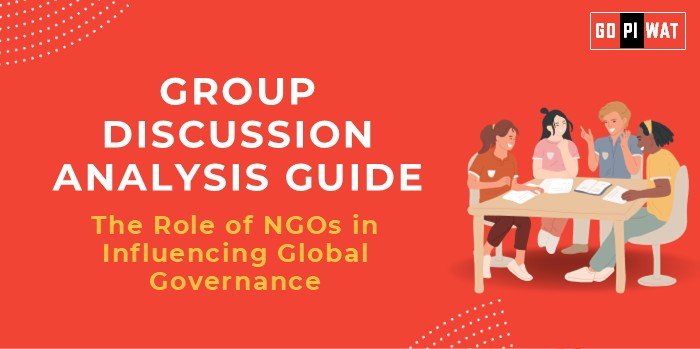📋 Group Discussion Analysis Guide: The Role of NGOs in Influencing Global Governance
🌐 Introduction to the Topic
- 🌍 Context Setting: Non-governmental organizations (NGOs) have emerged as pivotal players in shaping global governance, often filling gaps left by governments and corporations. From climate change to human rights, their influence is increasingly recognized.
- 📜 Background: NGOs gained prominence post-World War II, coinciding with the formation of global institutions like the UN. In recent years, their roles have expanded, driven by globalization and digitalization.
📊 Quick Facts and Key Statistics
- 📈 Number of NGOs Globally: Over 10 million NGOs operate worldwide, influencing policies on health, environment, and social justice.
- 🌍 Climate Advocacy: NGOs contributed to the 2015 Paris Agreement by lobbying for ambitious climate targets.
- 💰 Development Aid: NGOs mobilize over $30 billion annually in development assistance.
- 🌐 Global Reach: Amnesty International operates in 150+ countries, emphasizing human rights advocacy.
🏛️ Stakeholders and Their Roles
- 🏢 Governments: Collaborate with NGOs to implement international policies.
- 🌍 International Organizations: Include NGOs in policymaking (e.g., UN ECOSOC consultative status).
- 💼 Corporate Sector: Partner with NGOs for Corporate Social Responsibility (CSR) initiatives.
- 👥 Local Communities: Serve as beneficiaries and collaborators for grassroots programs.
🏆 Achievements and Challenges
✨ Achievements:
- 📜 Policy Influence: Played a key role in the landmine ban under the Ottawa Treaty.
- 🌍 Public Awareness: Raised global awareness on climate issues through campaigns like Fridays for Future.
- 🚨 Disaster Response: NGOs like Red Cross provide critical humanitarian aid during crises.
⚠️ Challenges:
- 💸 Funding Constraints: Dependence on donor funding can limit autonomy.
- 📉 Accountability: Critics question transparency and representation in global decision-making.
- 🌍 Global Comparisons: Scandinavian countries integrate NGOs into governance better than others.
📖 Case Study: Greenpeace’s campaign against illegal fishing in the Pacific resulted in stricter maritime laws.
💬 Structured Arguments for Discussion
- ✅ Supporting Stance: “NGOs democratize global governance by giving a voice to marginalized communities.”
- ❌ Opposing Stance: “NGOs lack accountability, leading to disproportionate influence without checks.”
- ⚖️ Balanced Perspective: “While NGOs are critical for inclusivity, they must adopt transparent practices to sustain credibility.”
💡 Effective Discussion Approaches
- 🎯 Opening Approaches:
- 📊 “NGOs influence over $30 billion annually, showcasing their role in global governance.”
- 🌍 “From climate agreements to disaster relief, NGOs bridge crucial governance gaps.”
- 🛡️ Counter-Argument Handling:
- 📖 Acknowledge criticisms of accountability.
- 🌟 Present NGO reforms (e.g., transparent funding mechanisms).
📌 Strategic Analysis of Strengths and Weaknesses
- 🌟 Strengths: Grassroots reach, policy advocacy, crisis response.
- ⚠️ Weaknesses: Resource dependence, politicization.
- 🌟 Opportunities: Increased partnerships with international bodies.
- ⚠️ Threats: Political backlash, donor fatigue.
📚 Connecting with B-School Applications
- 💼 Real-World Applications: Study NGO-public-private partnerships for strategic management courses.
- 🗨️ Sample Interview Questions:
- 🌍 “How do NGOs enhance or hinder global governance?”
- 📜 “Discuss the role of NGOs in achieving UN Sustainable Development Goals (SDGs).”
- 📖 Insights for B-School Students:
- 📚 Understand stakeholder engagement and crisis management strategies.


